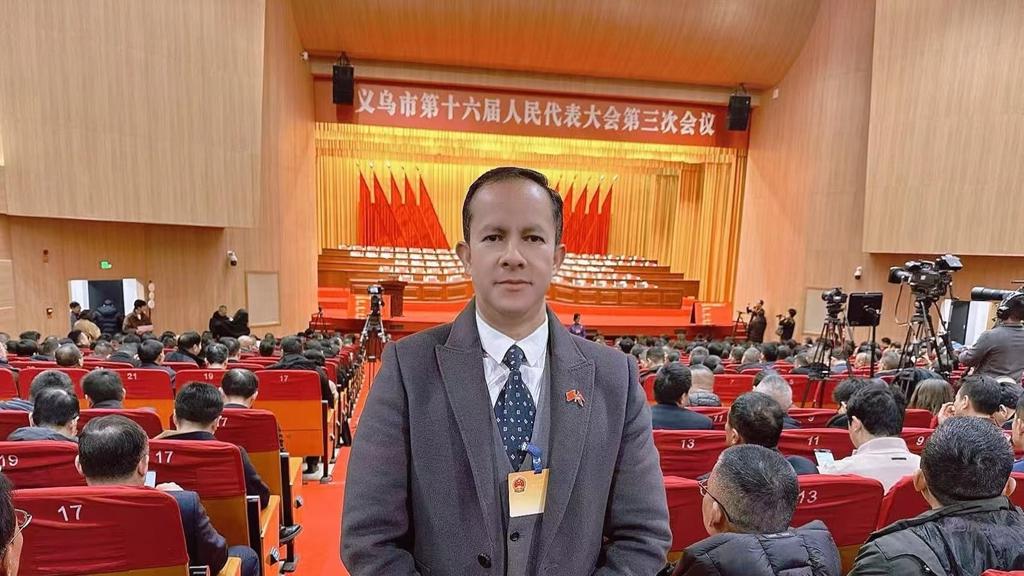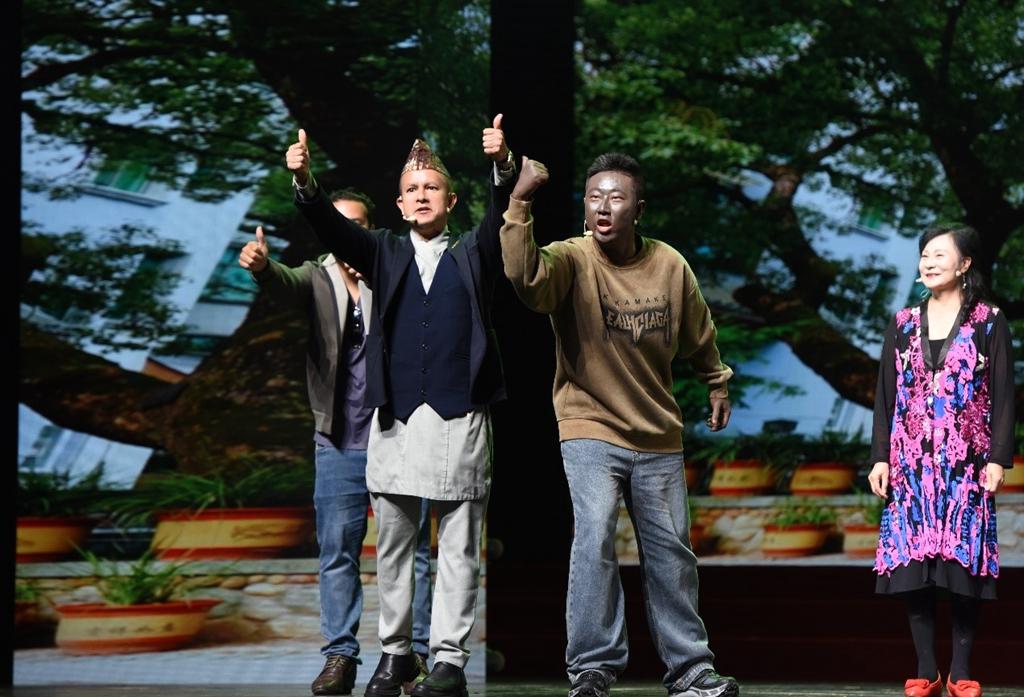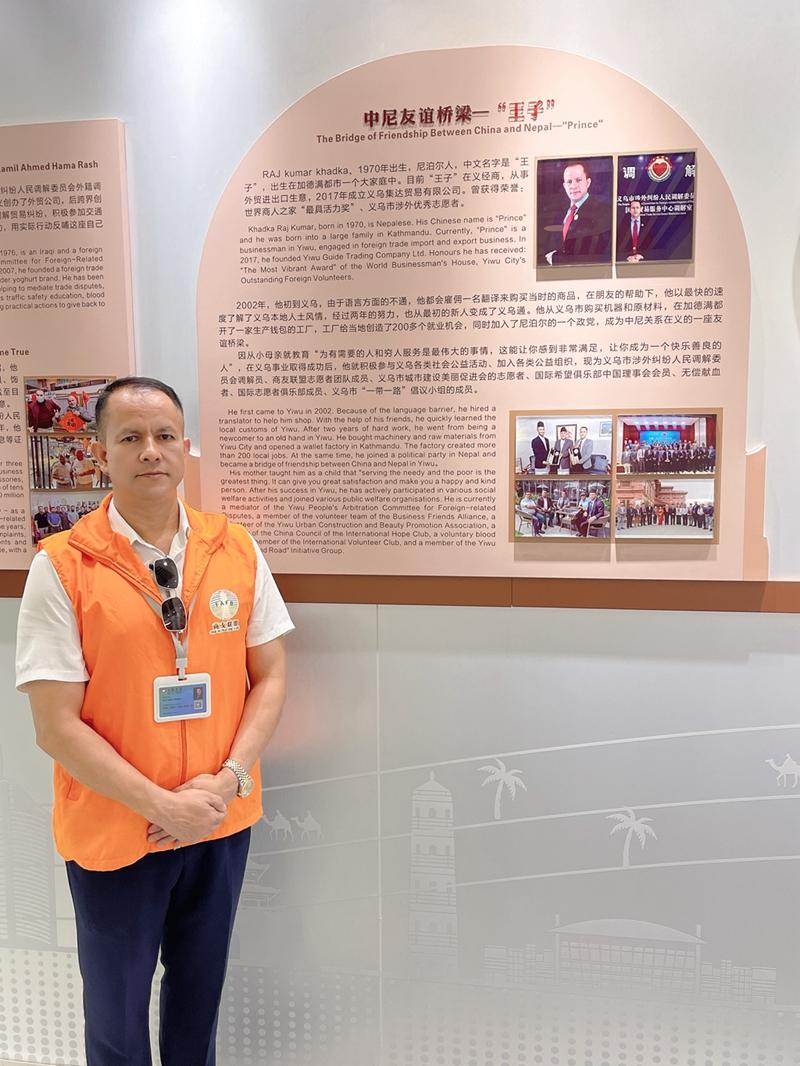China-South Asia: How fast Yiwu city flies
I have been living in Yiwu city in east China’s Zhejiang province for about 12 years. But it has been 22 years since I have a close relationship with this dear country of China!

Raj Kumar Khadka attends a Yiwu municipal people's congress.
About 30 years ago, my brother RC Khadka and I, opened a wholesale store of belts, purses and umbrellas in Kathmandu. We used to buy some goods in Kathmandu, while we used to import some goods from Thailand and India. At that time, there were only 2-4 other shops, including our shop, which did the wholesale business of such goods. Goods imported from outside could be sold in a few days without being able to keep them in the store!
After a few years, the names of China’s Guangzhou, Shanghai, and a few of Yiwu also started to be heard. As a teenager, I was very curious and wanted to understand everything inside and out. So, day by day, I started requesting my brother to go to China and bring the goods. But why didn’t my brother like to go to China and buy goods again and again. It is because he doesn’t have free time. If my brother reads this article, he will laugh once again!
In fact, even 28-30 years ago, tickets cost the same as now. If you ask in Nepali rupees, it will cost one hundred thousand only as a ticket. Hotels for food and accommodation were also expensive as they are now.
That time was different. Big cities like Shanghai and Guangzhou were developed at that time. But the city of Yiwu where I live now was underdeveloped. After reaching the city of Yiwu, even when going to buy goods to take to Nepal, we had to turn to the sky to see if it was cloudy or raining and leave the hotel with an umbrella. Because the old building of the Yiwu Wholesale Market at that time used to soak up the water when it rained heavily, and the traders used to do business with umbrellas. At that time, the first phase (District 1) of the world famous “FUTIAN” Market building was being constructed. Even going to the other side of this market, you had to walk with your shoes on because it was very muddy there. At that time, taxis were common. How many times have we gone from one place to another loaded like goods in a metal 3-wheeled rickshaw! If we narrate this to the present generation, they may laugh at the fact that it is an unbelievable fable.
Not much time has passed, just 22 years ago. In these 20-22 years, China has made such an extremely high leap in development that economists, politicians, and people all over the world watched.
Before telling you my experience of my beloved China that I have seen, experienced, and touched closely, I would like to tell an interesting story about why my Chinese name became “PRINCE”. In China, most people who want to engage in foreign business keep their English name along with their Chinese name so that it is easier for foreign customers to mention the name. Over my last 12 years of continuous stay in China, my Chinese friends have requested me to suggest good English names for them and I have also helped hundreds of those friends to have English names and some Nepali names.
I need a driver’s license because I live in China all the time. It was not possible to take a bus or taxi continuously! My first driving license in Nepal was about to expire, and after showing it on the computer, I was informed that I would get a Chinese license. At that time, there was a gentleman named John in Yiwu city, whose company helped to translate documents and open a business company in China. I let him translate my Nepali license from a Chinese driving license to his company. But instead of the Nepali name in my passport, I need a Chinese name! My Nepali name is “Rajkumar”. Which literally means “prince”. So I just said—keep “Wang Zi”! Finally, I filled out the application for a Chinese driving license under the name “Wang Zi”.
After getting my driving license, I went to a transport to check the goods bought from the traders. At that time, most of the salmon going to Nepal from China were loaded into trucks and taken to the border, and the trucks from Nepal were turned over and taken to the customs of Nepal, and after the customs were cleared, they were taken to Kathmandu and from there to different districts across Nepal!

Raj Kumar Khadka has leisure with his friends in China.
Later, after the devastating earthquake in Nepal in 2015, since the roads of Nepal connected to China’s border were completely unfit for transporting goods, the goods were loaded into containers and sent to Nepal through Calcutta, India, a third country. In this way, even in the trade between the two countries, Nepal and China, it was necessary to supply the goods through the third country, India.
Times have changed now. China is rapidly approaching the peak of development. Every month and day, good new news of technological development has started to be heard. Previously, when coming from Nepal, they had to enter China via Hong Kong. But now there are 10-12 daily flights from Nepal to cities like Guangzhou, Shanghai, Beijing, Chengdu, Kunming in China.
After Guangzhou, it took 20-22 hours by train or bus to Yiwu. But now one and a half to two hours can be reached by plane and 6-7 hours by high-speed train. At that time, to do business, you had to go to the bank, withdraw cash, sit on the transport and, after receiving all the goods, count the cash repeatedly and pay the merchants. Now you can pay through a mobile. Where is that? In China, technology is being used in every field. I would like to give a small example.
We were 5-6 foreigners among about 1500 Chinese citizen members in an organization called “building beautiful Yiwu city promotion association” in Yiwu city. We were asked to download an engineering application camera app on our mobile. If you see any garbage or broken things in your areas and areas, take photos from the app and send them to our Wechat group. This group is from 4-5 years ago. It was good, but I previously thought it was just for show and tell.
All the procedures to be done when traveling from abroad to China or departing from China have become digital. When traveling by train, bus or plane, let alone the local Chinese, even foreigners like us bought tickets online and walked with our passports. Neither the hassle of carrying cash nor the worry of having to carry tickets! It must be due to the effect of this that even in Nepal some numbers of cashless transactions have started to be done through mobile phones. We can take this as a positive effect.
If you want to apply for your visa, stay or register a business company, go to the app provided by the government, send copies of all the documents, apply and get a job within 5-8 days! Is it not convenient for people?
We are now in the twenty-first century. Technology and science are making great leaps. China is joining hands with the world with the Belt and Road slogan with an open heart and is walking in the vision of not only developing China, but also developing the world together and making a peaceful and happy world.
China is one of the countries that can be trusted by most of the countries in the world, in the perspective of ambition, ego and conflict between the countries of the world. Therefore, we and many countrymen like us hope that China will play a major role in peace efforts in the specific perspective of this period.
As I am a businessman, I always think a developing country in South Asia like us should be able to benefit from BRI (Belt and Road Initiative). We need to take immediate loans to invest in roads, agriculture, and the tourism industry, which are essential for development, and we should know how to walk along the path of development with the neighboring countries.
Our neighbor and friendly country China understands all this very well. That is why he is eager to give equal share in development and progress to not only Nepal, but all over the world with a big heart. It is considered wise for us to move forward with the slogan “mutual win”! If the neighbors are rich and happy, it will be even happier for China! It is said that “if you have happy and wealthy neighbors, you will never have to hear their quarrels and noise!” Confucius has also taught us this!
We should strengthen not only the governments of our two countries, but also the foundations of culture, arts, and faith among people. For that, I would like to express my heartfelt thanks on behalf of the Nepalese people for the efforts made by the Chinese government for art and cultural exchange. Art and cultural respect make friendship stronger! People or groups living in each other’s countries like us can be used for support and promotion in such activities!

Raj Kumar Khadka attends an exhibition on China-Nepal friendship.
(The author Raj Kumar Khadka is a trade representative of Nepal chamber of commerce in east China, a member of the China International Chamber of Commerce, and a mediator of Yiwu mediation committee for foreign related disputes. He is also a volunteer member of the many organizations such as a mediator and member of Friendship Alliance of Foreign Businessmen, Yiwu City Construction Beauty Promotion Association, a member of international volunteer club, and a Zero Waste International Ambassador of the Jinhua City.)